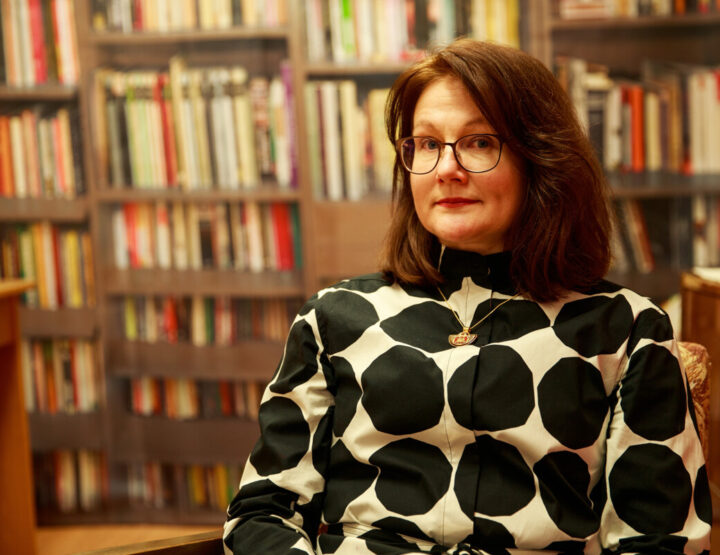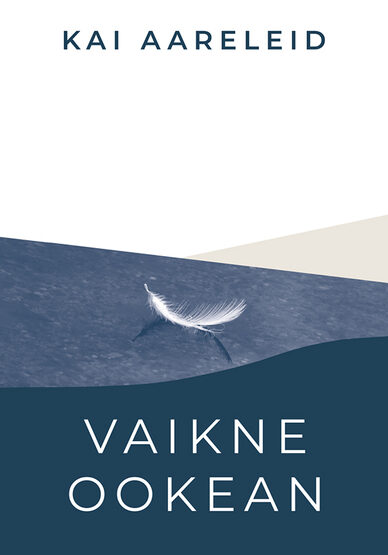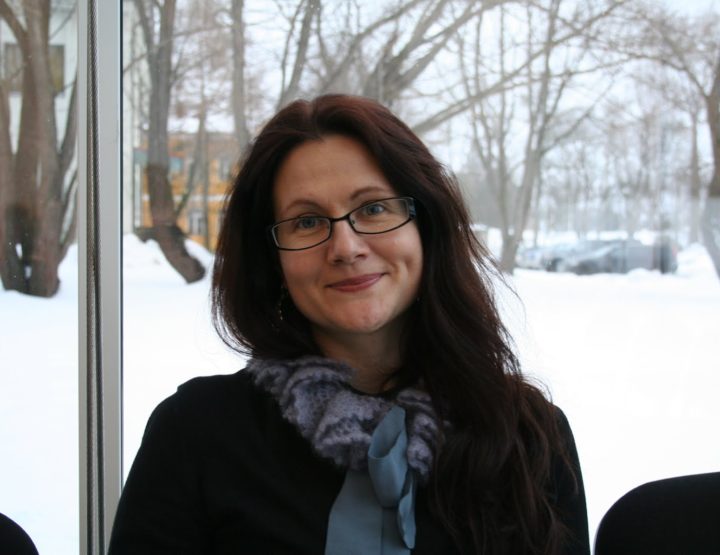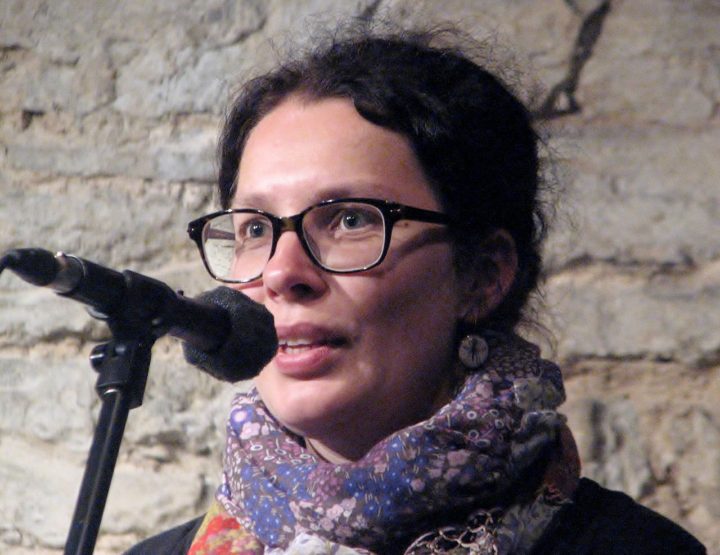1960
They meet up at Tiina’s house after school. Tiina puts her bag in her room and follows Vova, because he wants to show her his turtle. It’s the first time that Vova has invited her over.
Vova shows her his turtle. The turtle’s name is Timur.
His family’s roomy apartment is above the pharmacy on Heidemanni Street. Tiina really likes the thick rugs hanging on the walls of the living room and Vova’s parents’ bedroom: the rooms are like soft, dark caves. Vova has a happy life here, Tiina muses, and feels glad for him. Being so far away from your real home certainly mustn’t be easy. They, the Russians, must have a real home somewhere, and you always miss home. Even Tiina misses her home, even though that home is still here—only her family has crumbled.
A white saucepan rests on the gas stove in the kitchen. Vova lifts the lid and inhales.
“Mmm. Yesterday’s leftover borscht. Should we eat?”
Tiina nods. She is indeed hungry. It might be the tastiest soup Tiina has ever eaten.
And there’s a box-piano in Vova’s living room. An upright, Vova calls it. Upright, Tiina repeats.
It’s not merely an instrument, it’s a work of art. Tiina trails her fingers across the carved sound box. The wax of past candles has collected in the silver candleholders. Although Tiina has never played a piano before, she resolves at that very moment: someday, she’ll buy one like this for herself.
“C. M. Schröder,” Tiina slowly pronounces the golden lettering above the keyboard. To the right of it is writing in Cyrillic: А. Е. Яковлев, Санкт-Петербург.1
“It was my grandfather’s—my mother’s father. The upright and this…”
Vova fingers a metronome set on top of the piano, pushes the weight close to the tip, and releases the pendulum to swing slowly. The metronome ticks, beating calmly and steadily. Hearts don’t beat so calmly, Tiina thinks.
“Grandpa was a choirmaster at the Mariinsky. You know—at Maria Theater, at Kirov Theater, in Leningrad.”
“I’ve heard of it,” Tiina says, although she can’t remember what or when. Those whispers, as always.
“Leningrad had a different name then—St. Petersburg, like here on the upright. And it was also Petrograd at some point, in another time, the last…”
“Strange,” Tiina murmurs.
“What’s that?”
“Oh, nothing… Just it’s strange that we Estonians call it the “last time”, too. Or the “former time”.”
“That means during the last regime. Before the Soviet… Before the revolution, maybe. Before Lenin, right? Leningrad is named after Lenin—Lenin’s city. Petrograd was named after Czar Peter. The czar was like a king.”
“I know, but I’ve never really understood it all that well. I mean, that there was one time, sort of, and then another. At home, we still say “back in the Estonian time”.”
“Mm-hmm. Mom says that you guys did have your own country or your own czar back then. Before you joined the Soviet Union.”
Tiina’s fingers glide across the piano’s lustrous lid. Her hand stops, and she asks softly, without looking directly at Vova:
“At home, does your family talk about the last time at all?”
Vova doesn’t answer right away. Tiina peers at him from the corner of her eye and recognizes for a moment the same kind of abrupt guardedness, which she has sometimes noticed her mother and her godmother Ene and many other grown-ups displaying: a split-second frozen expression, a vague glance from side to side, tone slowed down a beat, and a softer voice.
“No,” Vova says, looks Tiina in the eye momentarily, looks away again, and adds:
“Mom tells me about it every once in a while. About her father and sisters and mother—my grandmother. About the war, the blockade.”
“The blockade?”
Vova nods.
“Was she in the Leningrad Blockade?”
Vova nods.
“I don’t like it when Mom starts talking about it; she gets kind of strange, somehow. All sad, and… I don’t want her to be like that.”
“I’d like someone to talk about it, rather. They only whisper about it at our home. Like you figure out there’s something, but everything’s just one big… тишина.”2
Vova looks at Tiina in surprise.
“Where do you know that word from?”
Tina shrugs, rolls her eyes, draws out the word:
“Leeermontov.”
They stand there, neither speaking for a while.
“Why’d you turn so sad just now?” Vova asks.
“I didn’t turn sad, I’m just thinking.”
Purposefully, Vova stops the metronome and says:
“I know! I’ll cheer you up in a jiffy. Come on, I’m going to show you something. Come, come!”
Vova leads Tiina to his parents’ bedroom.
“Go stand by the window and face the other way.”
Tiina hesitates.
“Go on, don’t be afraid.”
Tiina walks up to the window and stands next to the bed. Positioned on the nightstand are bottles of perfume, a framed photograph. In the photograph are a man and a woman, bride and groom. They don’t appear to be Vova’s parents—the clothes are from an older time. The man has a big, thick beard and is wearing a military uniform jacket: two rows of metal buttons and fringed epaulets.
“Papa and Mamma,” Vova says from behind Tiina. “Papa was a captain when he was young. Ta-daa! Look!”
And before Tiina can turn around, Vova breaks out in song.
He has donned a military cap and coat with fringes on the shoulders. He is dancing and flourishing his arms with gusto. Tiina can’t stay solemn for long, which only adds to Vova’s enthusiasm. He leaps before Tiina, snatches the hat from his head, pops it over his fist, and sings to it in Russian:
Captain, Captain, please do smile,
After all, your smile’s our ship’s flag…
Tiina has never seen Vova being so funny before. But he sings well. Vova fits the hat onto Tiina’s head and starts marching around the room:
“Well, Tinochka, sing! You know how to!”
And Tiina lets herself be pulled along. Her high soprano starts off cautiously in Russian:
Kapitan, kapitan…
But then, a mischievous spark flashes in her eyes, she stops, cocks the cap, and begins again more confidently in Estonian:
Smile, smile, our dear Captain,
for your smile’s the flag upon our mast!
Smile, smile, please do show your courage,
for the great wide sea’s only for courageous!
Tiina stops dancing in front of Vova, bows gentlemanly, and swings him into dancing with her: they dance from his parents’ bedroom into the hallway, along the hallway into the living room, circle around the coffee table (Vova stubs his toe and exclaims: ow!), and from there back into his parents’ bedroom through Vova’s own. Both are belting out the captain’s song in their own respective languages.
They plop down on Vova’s parents’ bed, giggling and panting. Vova throws himself back and crosses his arms over his stomach. Tiina stares at Vova for a few seconds, and then copies him.
“We’re totally crazy—you know that,” Tiina says.
“I like being totally crazy sometimes,” Vova replies.
“Me, too, I guess.”
They are silent. Tiina turns the hat this way and that in her hands.
“This isn’t a captain’s hat at all, though.”
“Nope, it’s my father’s. But so what. No doubt I’ll get a captain’s hat one day, too!”
“You will?”
“Yep.”
“How?”
“I’m going to be a captain myself.”
“Are you going to be a river captain, then, or what? There’s no sea here in Tartu.”
“There isn’t here, but there is elsewhere,” Vova says seriously.
“Elsewhere?”
“You can always dream. Can’t you?”
“I guess.”
Tiina is briefly silent, then adds:
“I hadn’t seen the sea at all until this year. I had no idea what was so special about it.”
“But you understood afterward?”
Tiina shrugs.
“The sea is cold. Big. I’m afraid of it, a little.”
Vova shakes his head.
“The sea is full of endless possibilities.”
Tiina doesn’t reply. They lay a couple dozen centimeters away from each other, staring at the chandelier.
“They got that chandelier for their wedding,” Vova suddenly says.
“It’s pretty.”
The chandelier glistens in the afternoon sunlight. Tiina digests the thought: for their wedding. She wonders: what was her own mother and father’s wedding like? And how can it be that sometimes, life goes…
Vova reluctantly pushes himself up, tries to look over his shoulder, and asks:
“It’s not wrinkled, is it?”
And Tiina replies:
“No, it’s not.”
“It’s made of good English fabric.
I guess it can’t wrinkle,” Vova mumbles, hanging the coat up on a hanger.
“What do you mean, “English”? Are you saying this isn’t your father’s uniform, then?” Tiina asks, and also stands up to bring Vova the hat. Vova places it on a shelf above the rack.
“No, it is. But Dad says that even though they always say it’s Soviet-made, it’s really actually fabric from England. Just that you’re not allowed to talk about it; that’s how things are these days.”
“Let’s not talk about it, then,” Tiina says, because in reality, she couldn’t care less.
These days, these times—they go over her head. And “time” is a singular word, just like “sky” and “friendship” and “love”. “Life”. Yes—“life”, too, she supposes.
Vova’s parents’ wardrobe creaks the exact same way her parents’ own does at home.
How can it be that sometimes, life… the thought resurfaces in Tiina’s mind, but Vova interrupts again. Sometimes, it’s good when someone disciplines your stubborn thoughts.
Vova asks:
“Do you remember how the lyrics to that captain’s song go on?”
Tiina shakes her head.
“I don’t either. Oh, well. Let’s go play with Timur.”





